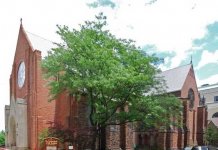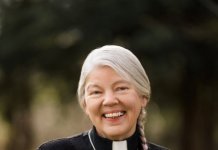Archbishop Thabo Makgoba has called on city authorities to send fire and sanitation inspectors this week into informally occupied buildings in Johannesburg, Durban and other towns to ensure their safety. He also called on NGOs fighting for the rights of people to stay in the buildings to secure court orders requiring local governments to enforce fire and hygiene by-laws.
At a church service for Anglican schools in Cape Town, he described last week’s fire in Albert Street and the recent gas explosion in Lilian Ngoyi Street as “an example of the rot that has infested parts of our beloved country.”
He continued: “I grew up in Johannesburg, commuted through the city as a schoolboy and both lived and worked in city centre parishes 30 years ago. Just a few weeks ago I visited the site of the gas explosion in Lilian Ngoyi Street, and was heart-broken to see the deterioration that has devastated a city I love. And now this week we have seen more than 70 people dying in that terrible fire, also in the city centre. Those of us who grew up in Johannesburg under apartheid knew the building that caught fire, number 80 Albert Street, as the Johannesburg pass office, where, at the thump of a stamp in your ‘dompas’, you were either allowed to stay in the city, or were endorsed out to try to eke out a living in your rural Bantusan. It is deeply distressing to see one kind of suffering in that building be replaced by another kind of suffering under democracy.
“We cannot and must not allow this situation to continue in our beloved country. As immediate first steps, the authorities need at the very least to send fire and sanitation inspectors this coming week into other similar buildings in Johannesburg, Durban and other towns where the same thing is happening. If they are not already doing so, the legal NGOs fighting for the rights of people to stay in those buildings must also get court orders requiring local governments to enforce fire and hygiene by-laws.”
Address by the Archbishop of Capetown at the Combined Confirmation Service for Anglican Schools in Cape Town
Herschel Girls School Music Centre, Cape Town
3rd September 2023
Readings: Exodus 3: 1-15; Romans 12: 9-21; Matthew 16: 21-28
May I speak in the name of God, Father, Son, and Holy Spirit. Amen.
My dear sisters and brothers in Christ, dear people of God, heads of participating schools – our host today, Mrs Heather Goedeke of Herschel Girls, Mrs Shirley Frayne of St Cyprian’s School and Mr Antony Reeler of Diocesan College – also friends and families, educators here present, I am pleased to join you once again as we share in this important milestone in the lives of the confirmation candidates who will be presented later in this service.
A warm welcome to you all. Thank you for inviting me today and, most importantly, thank you to the school chaplains – the Revd Andrew Weiss of St Cyprian’s, the Revd Monwabisi Peter of Bishops, and the Revd Lorna Lavello-Smith of Herschel. Let me also thank you all for the hard work you do in preparing candidates for confirmation. A special welcome to the parents and godparents of the confirmation candidates, together with those attending this service for the first time.
A big thank you, Revd Lorna, for hosting us in the Music Centre this year, and together with your team for preparing the service and a brilliant service booklet. It is always a joyous occasion when the schools in our diocese meet and worship together as a family.
Today, as we gather in the presence of God, we also testify to the special gift with which God, out of his goodness, will endow you, the confirmation candidates: the outpouring of the Holy Spirit into your lives. This rite of passage that you pass through today will help you to practise your faith more effectively in every aspect of your existence, expanding your relationship with God and strengthening your spiritual lives.
The Catechism teaches us that the Holy Spirit empowers us for worship, witness, and service. In worship we praise and give reverence to God. We begin this with the fear of the Lord – which doesn’t mean we should shiver in terror before the Lord, rather that we should stand in awe of the Lord. Fearing, or standing in awe of God, is one of the gifts of the Spirit. So, through worship we show respect for and love of God, admiring God with those who have faith and believe in him.
The first reading in Exodus (3:1-15) gives us an account of the call and commissioning of Moses. This happened at Mt. Horeb, far from Egypt, probably in the Sinai Peninsula, and is where God humbled Moses in spirit to prepare him to be God’s agent in delivering the people of Israel out of oppression. The story of the “burning bush” marks not only the revelation of God’s self to Moses, but also a mirroring of what God was to become in the life of Moses, and of what was to be the source and mainspring of his ministry. The story speaks both of God’s glory to a covenant people and of God’s compassionate defence of the downtrodden.
Because, sisters and brothers, just as God met the needs of the people of Israel in bringing them out of harsh bondage, in our own day God knows our condition and cares for us by responding to our cries and our needs. The first movement of God towards Moses is to outline in words what God proposes to do, to appoint Moses as one chosen and sent to lead his people. From poverty they were to enter a land of some expanse, a land of plenty. Friends, God does not simply act and then leave us to puzzle out an interpretation of what has happened. God starts by making Moses wise before the event, so that the activity of God, when it comes, confirms the word already spoken.
Moses is assured of the power of God. His old impulsive nature is humbled and his reluctance to carry out what seems an insuperable task is overcome by God’s assurance that he is up to it. One of the objections Moses raises to the task God is giving him is that people are ignorant of the character of God and, because of that, they will not believe the message he brings. In response God says: ‘I am who I am’ (Ex.3: 14), meaning that God will be proven to be dependable and resourceful enough to meet the people’s every need, and in this case will outmatch Pharoah in a contest of might and deliver them from Egypt.
In the gospel account we heard today (Matthew 16:21ff), that Peter – having been affirmed as the bedrock on which the church will be built – fails to understand the message of Jesus. Although Peter has previously been given the authority to do the work of God, the person named as the rock suddenly becomes an obstacle as a result of a change in attitude. Of course we now know that ultimately Peter indeed became the rock, the first Bishop of Rome.
What can we learn from the encounter of Moses and the invitation that Jesus extends to us? What do we imagine God to be in our lives? What is the one thing that each of us can take back to our schools, communities and families?
Now you might be hesitant to think of yourself as being up to the standards of Moses, or of Peter the Rock. But our faith tells us that, just as Moses and Peter proved to be equal to the challenge with which God presented them, each of us also is able to inherit the Kingdom of God – or in the words of Paul in his Letter to the Corinthians, we can inherit the Kingdom of God if we are “justified in the name of the Lord Jesus Christ and in the Spirit of our God” (1 Cor 6:11).
So today, as each of you receives the outpouring of the Holy Spirit, I challenge you, and I challenge all learners and parents at our Anglican schools, to open your minds and your hearts to the invitation extended by God. To those of you who will be confirmed today, and to all learners at St Cyprian’s, Bishops, Herschel and St George’s: it is in times like these in your lives and in the lives of our communities and our country that our destiny is shaped. Destiny is a matter of choice, not of chance, and so I appeal to you, as you embrace Jesus’s call to be his disciples, to allow him to shape you and form you in accordance with His will for your lives.
One of the challenges that I hope you will take up is to help to turn our country around from the path on which we are headed at present. As I said in my speech for the 40th anniversary of the United Democatic Front recently, we have achieved much in the last 30 years, in housing, in health and in education. Like Moses and the children of Israel, we have escaped the bondage of Egypt. But now, when we look around us and see the quality of governance in too many parts of our country, I have to ask: are we now, like Moses and the children of Israel, condemned to wander in the wilderness for 40 years?
Just think of recent events in Johannesburg as an example of the rot that has infested parts of our beloved country. I grew up in Johannesburg, commuted through the city as a schoolboy and both lived and worked in city centre parishes 30 years ago. Just a few weeks ago I visited the site of the gas explosion in Lilian Ngoyi Street, and was heart-broken to see the deterioration that has devastated a city I love. And now this week we have seen more than 70 people dying in that terrible fire, also in the city centre. Those of us who grew up in Johannesburg under apartheid knew the building that caught fire, number 80 Albert Street, as the Johannesburg pass office, where, at the thump of a stamp in your “dompas”, you were either allowed to stay in the city, or were endorsed out to try to eke out a living in your rural Bantusan. It is deeply distressing to see one kind of suffering in that building be replaced by another kind of suffering under democracy.
We cannot and must not allow this situation to continue in our beloved country. As immediate first steps, the authorities need at the very least to send fire and sanitation inspectors this coming week into other similar buildings in Johannesburg, Durban and other towns where the same thing is happening. If they are not already doing so, the legal NGOs fighting for the rights of people to stay in those buildings must also get court orders requiring local governments to enforce fire and hygiene by-laws.
But at another level, the power to change the direction in which our country is heading is in our own hands. As I told the UDF veterans, we must mobilize our energy, our courage, our imagination, our skills and our political will, and channel them into a drive to revitalise our country and realise the promises of our Constitution. Let us begin mobilizing today, right now, by turning to where all faith-based action should start, and that is in prayer. Can we please observe a moment of silence, praying for all those who were affected by the Joburg fire.
Thank you.
To those of you learners who are disillusioned by what you see around you, who are disenchanted with the state of our country, who see no future in public life or the political process, to you I say: we your parents understand your disillusionment. But opting out of involvement in any kind of public service or activism will not address the threats to our future. Doing nothing will not secure your future, or when you are older, your children’s future.
No, the answer to our crisis is for you to roll up your sleeves and join us in embarking on a New Struggle for a new generation. Please, I beg of you, young people, dare to dream and work for a country in which there is justice, equity and equality of opportunity. I repeat the call I made at Easter: Organise amongst yourselves, and those of you who are old enough, register with the Independent Electoral Commission, then campaign and vote in next year’s elections. We need a peaceful revolution in which young people stand up, reject corruption and self-dealing, and help get involved in the political process. And the older among us need to use our resources to help young people join in this process, for example by sponsoring voter education and workshops on our electoral system.
As I conclude, I want to thank all the educators, learners and families who continue to ensure that learning and teaching take place in all our schools. To those who teach, thank you for your dedicated work, you are among the most under-appreciated professionals in our society. Thank you for what you do to help our young people live in harmony with one another, to guide them away from simply fulfilling selfish ambitions.
May you all, learners and educators, be open to the moulding of God who calls you and holds you in his palms like clay, working to perfect you as you seek to follow Christ’s example of worship, service, and sacrifice.
Congratulations on your confirmation, and may God bless you, your family, South Africa and the world.
God loves you and so do I.
Amen










